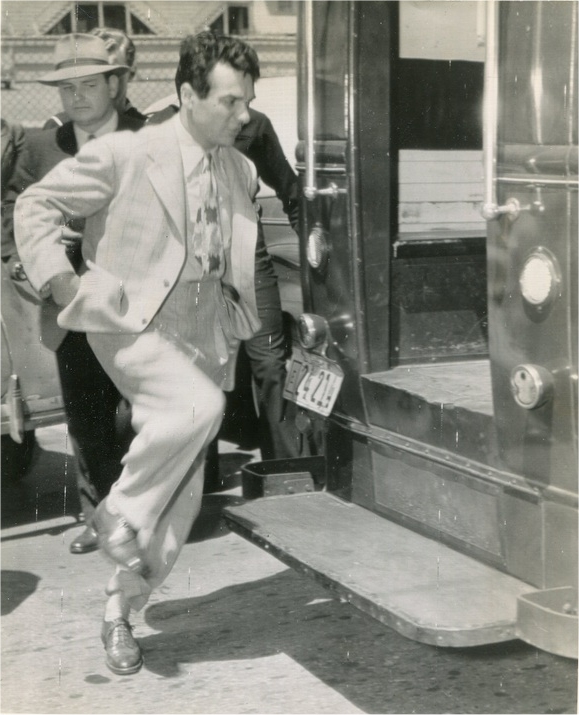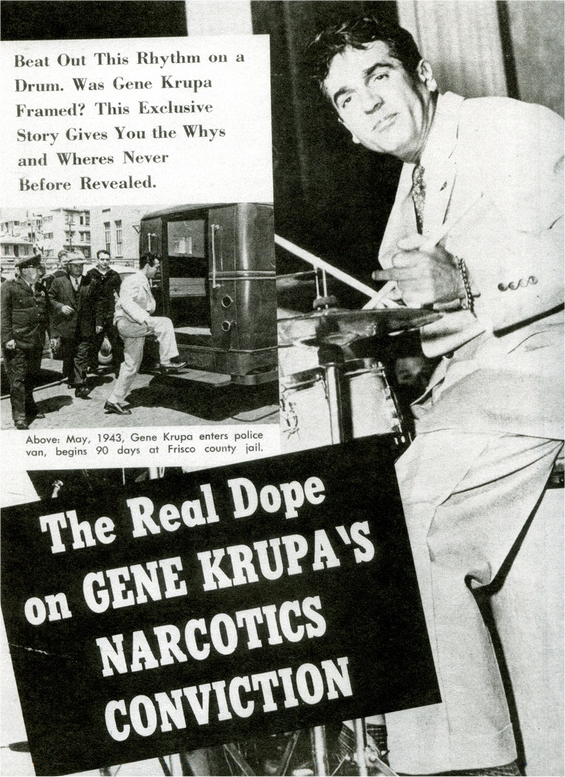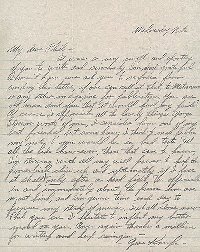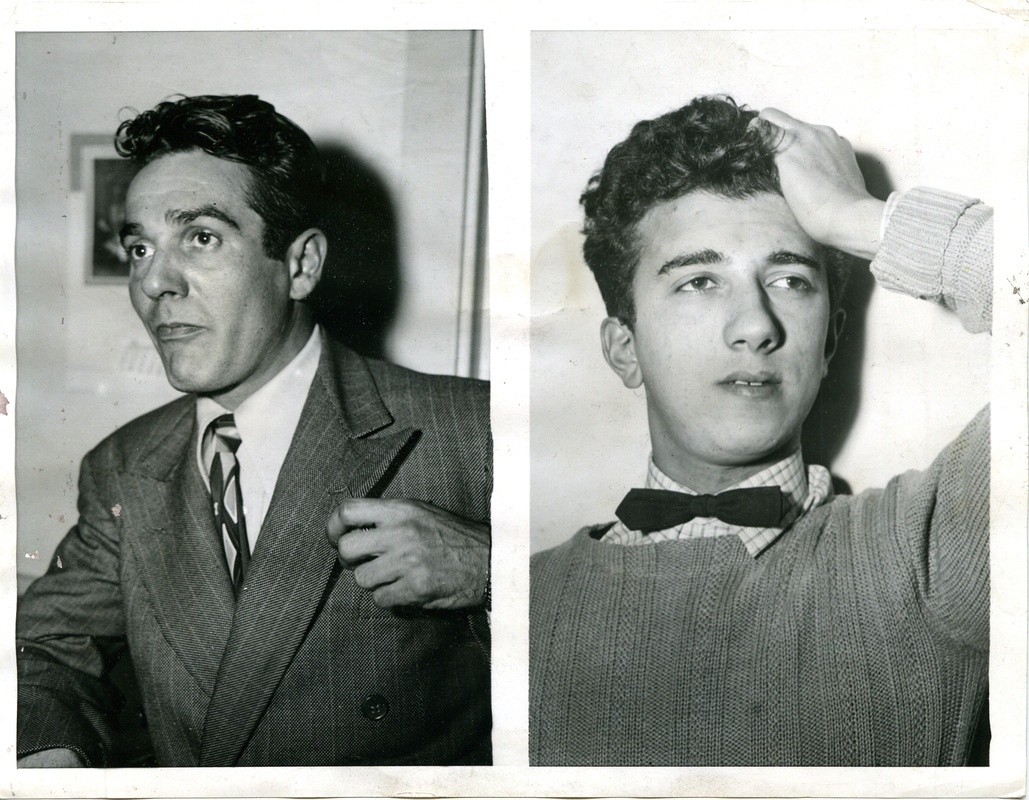GENE KRUPA IS ARRESTED
He Denies He Sent Boy to Get Marijuana Cigarettes
SAN FRANCISCO, Jan. 20 (UP) -- Gene Krupa, swing band leader, pleaded innocent today to a charge that he contributed to the delinquency of a minor by sending a 17 year old boy to his hotel room for marijuana cigarettes. Judge Thomas J. Foley continued the case to Jan. 26 on a motion by defense attorney, J.W. Ehrlich. Mr. Krupa was arrested last night by Federal narcotics agents after appearing at a local theatre. In continuing the case, Judge Foley made public a statement which the youth, John Pateakos, of Bedford, Mass., made to the narcotics agents. The District Attorney's office said that Federal agents arrested Pateakos and found marijuana cigarettes in his possession. Pateakos told the arresting officers, the District Attorney's office said, that he had been sent to the hotel room to get the cigarettes and that he was to take them to the band leader at the theatre. At the city prison, where he was booked and released, the band leader made a general denial of the charges "as I understand them."

Gene stepping into the paddywagon after his arrest.
"By then I was the glamour boy-15 camel hair coats, three trunks around me all the time-and he couldn't think what to get me. Finally he thought, 'Gee I'll get Gene some grass.' At that time California was hot as a pistol, you could park your car for a bottle of beer and get arrested. So he had a rough time getting the stuff. He probably shot his mouth off a little-'I'm getting this for the greatest guy in the world, Gene Krupa.' Gene decided to leave the marijuana at his hotel. The police, being tipped off, began searching the theater where Gene's band was currently playing. "I suddenly remembered the stuff's at the hotel where they're going next. So I call up my new valet and say, 'Send my laundry out. In one of my coats you'll find some cigarettes. Throw them down the toilet.' But the kid puts them in his pocket and the police nail him on the way out, so I get arrested." "The ridiculous thing was that I was such a boozer I never thought about grass. I'd take grass, and it would put me to sleep. I was an out-and-out lush. Oh, sure, I was mad. But how long can you stay mad? So long you break out in rashes? Besides, the shock of the whole thing probably helped me. I might have gone to much worse things. It brought me back to religion."
Gene
Krupa & John Pateakos
Busted:
The Story of Gene Krupa's Arrest, January 19, 1943,
by T. Dennis Brown. This is THE definitive &
exhaustive writing on Gene's fraudulent arrest Please note
that this is a 21-page PDF file You may read it within
your browser or download & save to read later.
by Jay Kobson
This Exclusive Story Gives You the Whys and Wheres Never Before Revealed.
Note: The following article appeared in the magazine "Lowdown" in the late 1940's. This periodical falls within the "True Detective" style of journalism and often overly-dramatizes their subjects. However, the details included are, for the large part, accurate. Gene's arrest was a totally manufactured event and nearly destroyed his career.

Justice is a beautiful, blindfolded lady who carries a pair of scales. It is on thses scales that she weighs the evidence. She is deliberately pictured as blindfolded so that she will not be swayed by what she sees-only by what she hears!
Sometimes the guilt or innocence of a man accused of a crime may depend upon a single word or phrase as: 'I swear I am telling the truth!" -or- "I lied when I said such and such."
Gene Krupa pleased guilty to a misdemeanor and was sentenced. He then was placed on trial for a felony. Had he been convicted of the felony, he would have gone to State's prison for many years.
The weird aspect of the whole Gene Krupa narcotics case is that both court hearings arose out of the very same incident.
Krupa's guilt and Krupa's innocence have already been determined by the courts of the great State of California. But what are the facts behind the facts? Here are The Lowdown facts:
On January 18th, 1943, Gene Krupa gave a shattering roll to his drums at the Golden Gate Theater in San Francisco, beat down again savagely, his hair and eyes wild, gave a final flourish and rose to thundering applause. He had, in a short time, come a long way. Many of the critics were saying that Krupa would in years to come belong among the ranks of the immortals of jazz.
Hot And Jumping
He really had something. He had that fast, quickpaced, almost impossible tension and speed that go to make up the frenzied beats that add up to American Music. His beats were solider, thumpier and rose to a crescendo that defied the ear. His hands were really quicker than the eye could follow. This pleasured the senses of fans and they rolled and stomped in the aisles.
There were the usual snickers and corner-of-the-mouth talk. But it was the kind of talk that all jazz players, the wind instrument boys and the drummers were victims of. As the story went (and still goes), Gene Krupa and his fellow drummers smoked marijuana in order to get that drum beat drumming. The weed, it was (and is) said stepped up their impulses and reflexes so that it was the weed that was playing-and not the genious. The boys were hopped up, it was said, to keep their sticks hopping.
Gene was not excepted from rumors. Not that anybody cared if the rumors were true. But of course it's against the law to possess or to smoke the weed which grows wild all about the United States.
As he came off the bandstand, he was grabbed by two Federal agents from the Narcotics Squad. It was at the peak of his career. With his drums, he had rolled out a fortune of more than $100,000 and his fans numbered in the hundreds of thousands.
Curiously, just about when Krupa was in the toils of the law, still another narcotics agent was about to enter and search his room at the fashionable St. Francis Hotel.
According to the charge, the agent stepped off the elevator on the seventh floor just about when a young man , John Pateakos, was about to step in. John, who was just under 21 years of age was about to be inducted into the Army, was grabbed and searched. John was employed by Gene to care for his drums, sticks and other equipment. The boy was music crazy and sold himself to Krupa as a valuable asset. So Gene hired him.
On John, there was found marijuana in two envelopes which allegedly had come from Krupa's room. The insinuation was that Gene had sent the boy to his room to get rid of the evidence. John was now held on charges of possession and Gene was taken to the city prison and booked under the statute of contributing to the delinquence of a minor.
These are the amazing facts when you take a close look at them. Gene, mind you, was not held for the Federal authorities at all. After all, with the Feds making the pinch, it stands to reason that they would make a federal case out of it. But instead, they handed the drummer over to the local city officials. Why, no one knows.
Another amazing thing is that the newspapers seemed to know all about the case soon as it broke. Immediately, the headlines had this to say: "Dope and Delinquency!" In other words, Gene Krupa was demoralizing the youth of the nation, because John was being held. There were no charges against Krupa that he himself was guilty of possession and use of narcotics. None at all! These were to come up later.
Gene called in the most famouse criminal lawyer in the West, Jake Ehrlich. Bail of $1000 was set and Gene walked out under bond.
Now, the papers took it the business of contributing to the delinquency of a minor. It was hinted that John Pateakos was just about 17 years old. This is patently ridiculous and was later disproved. He was almost 4 years older at the time.
The drum beat of the headlines did not die down. When the preliminary hearing came up, here is a section of John's testimony:
Pateakos: Mr. Krupa asked me to go to his room and get an envelope from his pocket.
Question: What did you do?
Pateakos: I went to the hotel to get this envelope from the coat pocket.
Previously, an agent had testified that Krupa, following the arrest, had asked to leave to go to the washroom. He said that he saw Gene in the hallway talking with John.
According to John's testimony, the hotel clerk had refused to give him the keys to Gene's room. He said that he "talked" a bellboy into opening the door. Then he said he bumped into the federal agents at the elevator.
The prosecutor then said that John might be subject to the draft and that he might not be around to testify. Strange goings-on here simply because the Army always allows witnesses in a criminal trial an extension. Another odd going-on, was the fact that John of a sudden was no longer a kid but a potential draftee!
At any rate, Gene was held over for the Superior Court and again released on bail. It looked as though the prosecution had a cinch of a case. But he was now under the cloud of a felony, which might mean a term of years in the State Prison. The delinquency charge was just a misdemeanor. Krupa was now facing two charges arising out of the same alleged crime.
1) The misdemeanor was based on contributing to John's delinquency.
2) The felony charge was pegged to the fact that he had allegedly used a "minor" to transport narcotics.
They were going to have Krupa, impaled on a drumstick, on two charges stemming from one alleged commision of a single crime.
The Constitution and the laws of every state in the nation say that a man accused of a crime shall not stand in double jeopardy. In other words, they can't try and rap you twice!
Meanwhile, John was being held in protective custody as a material witness. No one quite understood why this was necessary or who was threatening John. Suddenly, he was released and even more suddenly, he vanished.
Ehrlich Ponders
Ehrlich, the shrewd lawyer, did a lot of thinking. He also talked to Gene's manager. If he allowed the case to come to trial, the resultant upsurge of publicity would snuff out the remnant of Gene's career. Already, the usavoury stories had done him no little harm. The U.S. public has a horror of narcotics users. And this, coupled with the fact of contributing to the delinquency of a minor, made the public shudder even more.
Ehrlich suggested that Gene get this thing over with. As a first time loser on a mild charge, he probably would get off with a suspended sentence if he pleased guilty. And the thought was, that the thing would blow over.
So Krupa stood up before the judge and was sentenced. To Ehrlich's consternation, Gene was fined $500 and was given a jail term of 90 days.
Now, the prosecution gleaned, it could prove the second and more serious charge. Now they really had Gene. For if he pleaded guilty to contributing to the delinquency of a minor then he must be guilty of using the minor to transport his narcotics. It looked as though Gene, when he got through with his 90 day rap, would take up quarters for several years in the State Prison.
Then, a most astonishing thing happened in this bizarre and astonishing case. On June 28th, 1943, the prosection decided to go ahead with the case with the key witness, John Pateakos, missing. A truly strange state of affairs! How could they? They just relied on the fact that Gene had plesed guilty to the first charge! That would hang him on the second, they reasoned!
The testimony took an odd turn, odd simply because it consisted in great part of allegations that musicians, especially drummers, used marijuana. A weird bit of evidence in a court of law!
Leslie Gillen, an assistant district attorney, prosecuted the case. Gillan's questions ran as follows:
Gillen: Is it common knowledge that marijuana is frequently used because of it's definite propensity for distorting time by so-called hot musicians? Jazz musicians?
(In other words, he was asking whether the weed speeded up the drumbeat.)
A narcotics agent said yes.
Gillen: And that is so they can beat the drums or play a cornet or trombone without feeling the effect of doing it?
The agent agreed that "That is right."
Then Gillen got on Krupa and asked him the same questions, but this time he personalized it. He wanted to know if Krupa attempted a faster rhythm and tempo while under the influence of the narcotic.
Krupa had nothing but contempt for the question. He explained patiently that it was all a matter of technique that came about after hard work and study.
This is what he said:
"A man's ability to beat his drums faster than someone else is because he has developed his technique to a higher point and it is easier to play fast than it is for someone to play slow."
Then he added: If I am able to play faster than someone else it is because I have studied it, and developed my technique."
Krupa also emphasized that in his opinion only drummers in small numbers, failures all, used the weed. He said that anyone under narcotic influence gets slowed down.

On June 30th, the jury found Gene Krupa guilty of a felony and the judge sentenced him to one to six years in San Quentin Prison. The drummer faced the court and did not crack at all. He was released on bail pending an appeal.
Meanwhile, it appeared as though his career was over.
It was now July, Krupa was serving the last of his 90-day term in the county jail.
Then the headlines broke.
John Pateakos has been found. He was located by the FBI and had been turned over to the district attorney on loan. All the time John was in hiding from his Selective Service Board to which he had not reported. But there was no mention that this evasion of the draft laws might subject John to a five-year term in a Federal Prison.
On August 9th, Gene came out of the county jail, was arraigned on the felony bail hearing and released on $5000 bail while waiting out the appeal.
Now all kinds of charges flew about. The prosecution said the Ehrlich, Krupa's attorney, had "bribed" John with $650 to stay in hiding and get out of town. There were stories that Ehrlich and a member of his staff would be indicted on bribery.
And indeed, a Grand Jury was convened to look into the matter. Ehrlich produced two signed statements made by John. He proved that all the time he was presumed to be missing, John was living right in Los Angeles.
Nothing was done to John at all. There were no charges against him for violation of the Selective Service Act; there was no charges against him for being a minor in possession of narcotics. Nor were there any charges against him for perjury, as there may have been from his later testimony.
On February 15th, 1944, almost a year after the abortive case had begun, John Pateakos, in Army uniform (and no-longer a so-called wayward minor as the press had made out), testified as follows in juvenile court:
"I lied," he said. He swore that he had been coached in his testimony by narcotics agents. He said he had never been asked by Gene Krupa to get marijuana from Krupa's room.
On May 31st, 1944, the California District Court of Appeals, in a thumping decision, overruled the jury's verdict and set Gene Krupa free.
Thus, under the laws of our land and in all fairness to the great drummer, it is high time to halt the innuendos and the sneers. It is also high time to halt any similar attacks and smears on the great players of our time.
All hail, Gene Krupa, Bang it out eight to the bar. And we know it's you, and not the weed, that's doing the magnificent drumming.
The following is a transcription of a letter that Gene wrote to a fan while he was incarcerated in the County Jail.
It's very apparent
that Gene thought that his career was over:
 "My Dear Phil-
"My Dear Phil-It was very swell and sporting of you to write and sincerely I'm very grateful. I must how-ever ask you to refrain from sending this letter, if you can call it that, to Metronome or any other magazine for publication. You see old man don't you that it would hurt my pride? Of course I appreciate all the lovely things George Simon wrote of me, I consider him one of my best friends, but somehow I think to make public my note to you would be in bad taste. Tell all the kids how-ever, those that care to know, I'm striving with all my will power to keep the proverbial chin up, and ultimately if I lose it shall be only after a hard fight. The officials in and immediately about the prison here are most kind, and I'm given time each day to pursue my study of music. I shall close now. Phil you see I hesitate to inflict my bitter mood on you. Once again thanks a million for writing and keep swingin,'
- Gene Krupa "



